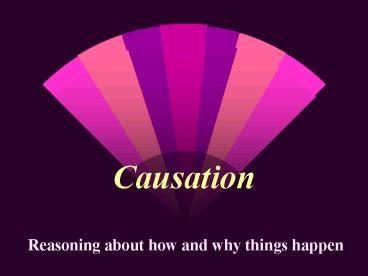Causation - PowerPoint PPT Presentation
1 / 21
Title:
Causation
Description:
Evaluation of a Causal Claim. May be intended as a causal hypothesis ... enter the presidential race in 2004, it will force the candidates to address my issues. ... – PowerPoint PPT presentation
Number of Views:29
Avg rating:3.0/5.0
Title: Causation
1
Causation
- Reasoning about how and why things happen
2
The Main Issue in Causal ReasoningEvaluation
of a Causal Claim
3
The Main Issue in Causal ReasoningEvaluation
of a Causal Claim
May be intended as a causal hypothesis
If I, Ralph Nader, enter the presidential race in
2004, it will force the candidates to address my
issues.
4
The Main Issue in Causal ReasoningEvaluation
of a Causal Claim
May be intended as a causal hypothesis May be
intended as a conclusion based on observation or
inductive inference
Power corrupts, and absolute power corrupts
absolutely.
5
Reasoning patterns that work
6
Reasoning patterns that work
- Relevant difference reasoning
If an effect is present in one situation but not
present in other similar situations, consider
relevant differences as causes of the effect.
Screen for alternative causes.
7
Reasoning patterns that work
- Relevant difference reasoning
If an effect is present in one situation but not
present in other similar situations, consider
relevant differences as causes of the effect.
Screen for alternative causes.
- Common thread reasoning
If an effect is present in multiple situations,
consider as a cause any feature that is present
whenever the effect is present. Consider
alternative causes.
8
Reasoning errors and patterns that dont work
well enough
9
Reasoning errors and patterns that dont work
well enough
- Post hoc fallacy (post hoc ergo propter hoc)
Occurs when the fact that one event occurred
before another is uncritically taken as
sufficient evidence that the earlier event caused
the later event
10
Reasoning errors and patterns that dont work
well enough
- Post hoc fallacy
Occurs when the fact that one event occurred
before another is uncritically taken as
sufficient evidence that the earlier event caused
the later event
- Overlooking a common thread or cause
11
Reasoning errors and patterns that dont work
well enough
- Post hoc fallacy
Occurs when the fact that one event occurred
before another is uncritically taken as
sufficient evidence that the earlier event caused
the later event
- Overlooking a common thread or cause
- Focusing on irrelevant threads or differences
12
Reasoning errors and patterns that dont work
well enough
- Post hoc fallacy
Occurs when the fact that one event occurred
before another is uncritically taken as
sufficient evidence that the earlier event caused
the later event
- Overlooking a common thread or cause
- Focusing on irrelevant threads or differences
- Overlooking possibility of reversed causation
13
Reasoning errors and patterns that dont work
well enough
- Post hoc fallacy
Occurs when the fact that one event occurred
before another is uncritically taken as
sufficient evidence that the earlier event caused
the later event
- Overlooking a common thread or cause
- Focusing on irrelevant threads or differences
- Overlooking possibility of reversed causation
- Asserting a wrong common cause
14
Reasoning errors and patterns that dont work
well enough
- Post hoc fallacy
Occurs when the fact that one event occurred
before another is uncritically taken as
sufficient evidence that the earlier event caused
the later event
- Overlooking a common thread or cause
- Focusing on irrelevant threads or differences
- Overlooking possibility of reversed causation
- Asserting a wrong common cause
- Appealing to anecdotal evidence
15
Problems in causal reasoning
16
Problems in causal reasoning
- Circularity
Occurs when the statement of cause essentially
restates the effect, typically as a definition or
description
17
Problems in causal reasoning
- Circularity
Occurs when the statement of cause essentially
restates the effect, typically as a definition or
description
- Testability issues
Occur when the statement of cause is
inappropriately difficult or impossible to falsify
18
Problems in causal reasoning
- Circularity
Occurs when the statement of cause essentially
restates the effect, typically as a definition or
description
- Testability issues
Occur when the statement of cause is
inappropriately difficult or impossible to falsify
- Specificity issues
Occur when the statement of cause is
inappropriately vague, especially from use of
undefined terms
19
Problems in causal reasoning
- Circularity
Occurs when the statement of cause essentially
restates the effect, typically as a definition or
description
- Testability issues
Occur when the statement of cause is
inappropriately difficult or impossible to falsify
- Specificity issues
Occur when the statement of cause is
inappropriately vague, especially from use of
undefined terms
- Inclusion of unnecessary assumptions
20
Problems in causal reasoning
- Circularity
Occurs when the statement of cause essentially
restates the effect, typically as a definition or
description
- Testability issues
Occur when the statement of cause is
inappropriately difficult or impossible to falsify
- Specificity issues
Occur when the statement of cause is
inappropriately vague, especially from use of
undefined terms
- Inclusion of unnecessary assumptions
- Conflict with well-established theory
Critical thinking theory places the burden of
proof on new or unusual ideas
21
Causal reasoning alternatives
- Materialism
All events have at least one physical/material
cause and no non-material cause
- Single causation
Every effect has one and only one unique cause
- Dependent co-arising (Buddhist)
At least two entities must participate in the
causation of any phenomenon, which is made
possible by the natures of the entities involved
- Theory of changes (Chinese)
Situations have essential structures that tend to
change in patterned ways
















![❤[PDF]⚡ Tropes: Properties, Objects, and Mental Causation PowerPoint PPT Presentation](https://s3.amazonaws.com/images.powershow.com/10046661.th0.jpg?_=20240603052)














